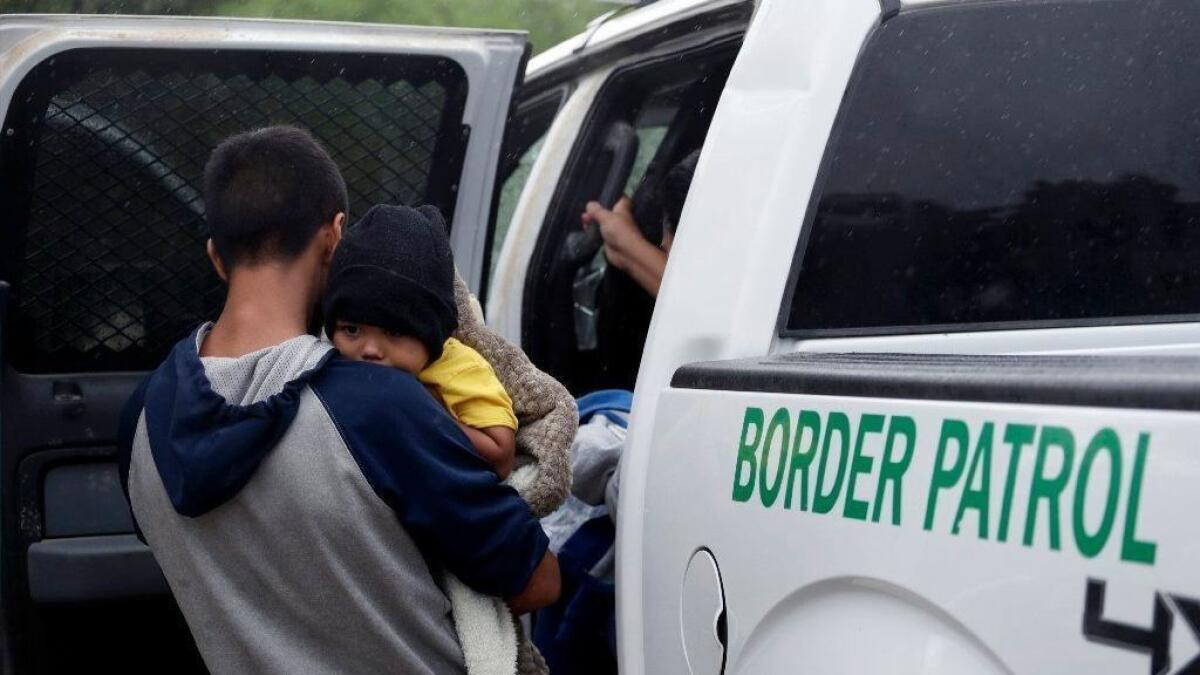Trump restricts asylum further but faces legal and financial limits

Reporting from Washington — President Trump has issued new rules to further restrict the asylum claims overwhelming the nation’s immigration system, even as the White House prepares a request to seek more money from Congress for stiffer enforcement and faster processing of migrants.
The Homeland Security Department, which enforces immigration law and has an overall budget of about $50 billion, will run out of money before the fiscal year ends in September because of increased demands from a surge of migrants on the southern border, according to the acting secretary, Kevin McAleenan.
Despite Trump’s efforts to crack down, asylum claims and overall immigration have increased steadily in recent months, chiefly from families fleeing persecution, violence and poverty in Central America. More than 90,000 migrants were apprehended last month alone, the highest monthly tally in more than a decade.
“Simply put, the system is full and we are well beyond our capacity,” McAleenan told a House appropriations subcommittee Tuesday.
Immigration advocates and other critics said Trump’s new rules, which include making asylum seekers pay application fees, will exacerbate strains at the border and potentially backfire against White House efforts to reduce immigration.
In a presidential memo released Monday night, Trump instructed McAleenan and Atty. Gen. William Barr to take steps to implement the measures within 90 days. The restrictions are likely to face court challenges.
The memo also called for barring work permits to migrants who cross the border between official entry points, and for resolving all asylum cases within 180 days.
The memo does not say how Barr and McAleenan, who recently replaced Kirstjen Nielsen, are supposed to clear asylum cases in six months. Cases now take an average of two years.
The Trump administration has increased, rather than reduced, the court backlog of more than 800,000 cases, including by instructing judges to reopen closed cases.
Although migrants have a legal right to claim asylum, Trump has declared that many of those filing for asylum are faking their claims.
“The biggest loophole drawing illegal aliens to our borders is the use of fraudulent or meritless asylum claims to gain entry into our great country,” Trump said in a statement accompanying the memo.
Rep. Lucille Roybal-Allard (D-Downey), who chairs the Homeland Security Appropriations subcommittee, said Trump’s latest rules will “make matters worse” for migrants.
“Unfortunately, efforts to ensure the safety and civil rights of migrants so far appear to be only an afterthought,” Roybal-Allard said. “The president’s memo is another tragic step in the wrong direction.”
Illegal immigration is below levels seen from the 1980s to mid-2000s, but Trump and his aides have been frustrated by the recent influx at the border.
Although the vast majority of asylum seekers pass an initial interview to determine whether they have “credible fear” of persecution, only about 1 in 5 are ultimately granted permission to stay in the United States — a disparity the administration argues is proof that fraud is rampant.
Immigration and Customs Enforcement recently announced it would send highly trained teams of investigators to the border to root out what it called “fake families.”
But advocates say it is difficult to win asylum cases. Few migrants have lawyers to help them gather the extensive documentation required and navigate America’s complex immigration system. In any case, fraudulent family claims are extremely rare, according to Homeland Security data.
In the last 12 months, agents identified about 3,100 individuals in family units making fraudulent claims. Those include migrants who claimed to be minors but were older than 18, said Brian Hastings, the Border Patrol’s chief of law enforcement operations.
The total is roughly 1% of all family units apprehended at the border in that period.
In seeking more money and new rules, the administration tacitly acknowledged that legal and financial limits have hindered its efforts to get “tougher” on immigration, as Trump has demanded. Congress has largely refused to provide substantial new funding for immigration enforcement, or to change longstanding asylum law.
The White House has urged Congress, so far without success, to amend rules prohibiting children from being detained for longer than 20 days. The administration argues that it has been forced to release migrants who then do not show up for court hearings.
McAleenan pushed back against critics who say the administration wants to detain children and families indefinitely.
“The notion we want to detain them indefinitely or longer than 180 days could not be further from the truth,” McAleenan said. “The idea that we want to detain children for a long time is not accurate, nor would that be an effective way to enforce immigration laws.”
Few countries that are signatories to international treaties on refugees charge fees to apply for asylum. Many migrants, including those coming to the U.S.-Mexico border, arrive with little but the clothes they wear.
Foreigners in the United States without authorization are already barred from nearly all public benefits. But Stephen Miller, Trump’s top advisor on immigration, has sought to discourage other immigrants from accessing a wide range of public benefits, including for their children who are U.S. citizens.
Most asylum seekers are not eligible to work until six months after they’ve formally filed their claims. They generally cannot access support programs until courts have granted them legal protection.
Vicki Gass, a senior policy advisor for Central America and Mexico at Oxfam America, a nonprofit charity, said taking away work permits could promote violations of labor laws and put already vulnerable populations in greater danger of exploitation.
“Without work permits, asylum-seekers will be forced to work in the underground economy, putting them at risk of labor and human rights violations,” Gass said in a statement.
Pili Tobar, deputy director of America’s Voice, a pro-immigrants rights group, cited poet Emma Lazarus’ famous welcoming words in the pedestal of the Statue of Liberty.
“Lazarus didn’t add ‘pay to play’ in an asterisk,” she said in a statement, “or include ‘this offer only valid...’ terms in the fine print.”
Twitter: @mollymotoole
More to Read
Get the L.A. Times Politics newsletter
Deeply reported insights into legislation, politics and policy from Sacramento, Washington and beyond. In your inbox three times per week.
You may occasionally receive promotional content from the Los Angeles Times.











